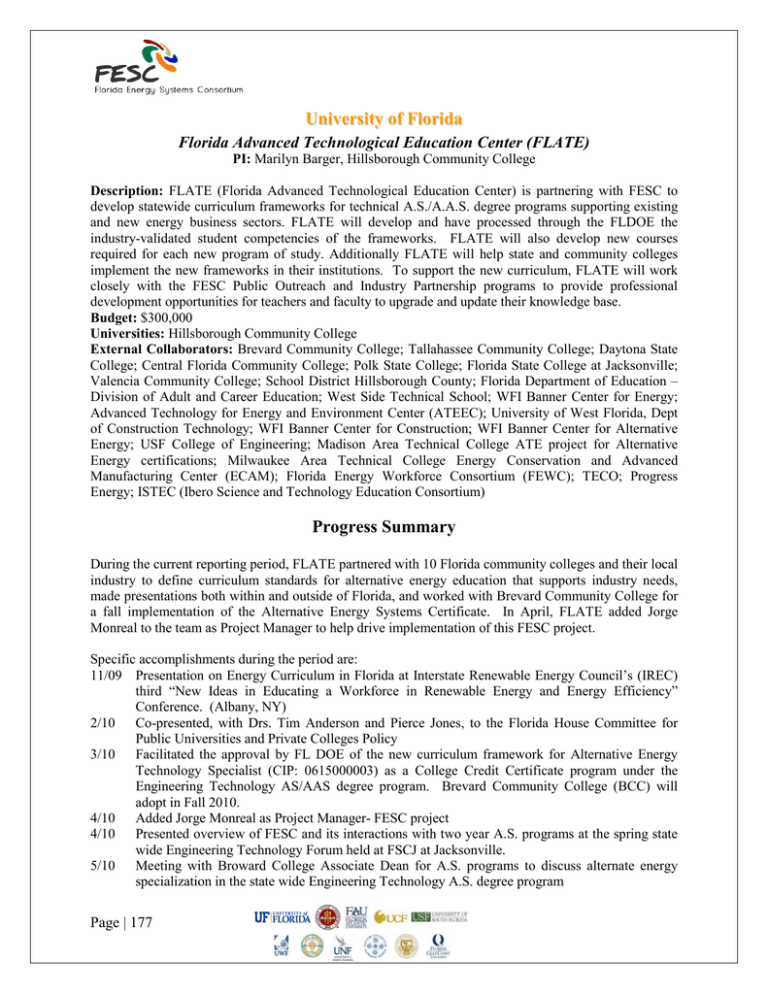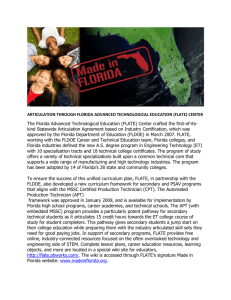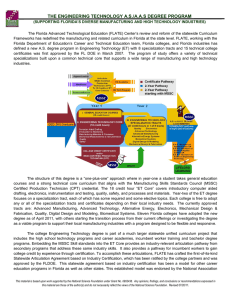Florida Energy Systems Consortium
advertisement

University of Florida Florida Advanced Technological Education Center (FLATE) PI: Marilyn Barger, Hillsborough Community College Description: FLATE (Florida Advanced Technological Education Center) is partnering with FESC to develop statewide curriculum frameworks for technical A.S./A.A.S. degree programs supporting existing and new energy business sectors. FLATE will develop and have processed through the FLDOE the industry-validated student competencies of the frameworks. FLATE will also develop new courses required for each new program of study. Additionally FLATE will help state and community colleges implement the new frameworks in their institutions. To support the new curriculum, FLATE will work closely with the FESC Public Outreach and Industry Partnership programs to provide professional development opportunities for teachers and faculty to upgrade and update their knowledge base. Budget: $300,000 Universities: Hillsborough Community College External Collaborators: Brevard Community College; Tallahassee Community College; Daytona State College; Central Florida Community College; Polk State College; Florida State College at Jacksonville; Valencia Community College; School District Hillsborough County; Florida Department of Education – Division of Adult and Career Education; West Side Technical School; WFI Banner Center for Energy; Advanced Technology for Energy and Environment Center (ATEEC); University of West Florida, Dept of Construction Technology; WFI Banner Center for Construction; WFI Banner Center for Alternative Energy; USF College of Engineering; Madison Area Technical College ATE project for Alternative Energy certifications; Milwaukee Area Technical College Energy Conservation and Advanced Manufacturing Center (ECAM); Florida Energy Workforce Consortium (FEWC); TECO; Progress Energy; ISTEC (Ibero Science and Technology Education Consortium) Progress Summary During the current reporting period, FLATE partnered with 10 Florida community colleges and their local industry to define curriculum standards for alternative energy education that supports industry needs, made presentations both within and outside of Florida, and worked with Brevard Community College for a fall implementation of the Alternative Energy Systems Certificate. In April, FLATE added Jorge Monreal to the team as Project Manager to help drive implementation of this FESC project. Specific accomplishments during the period are: 11/09 Presentation on Energy Curriculum in Florida at Interstate Renewable Energy Council’s (IREC) third “New Ideas in Educating a Workforce in Renewable Energy and Energy Efficiency” Conference. (Albany, NY) 2/10 Co-presented, with Drs. Tim Anderson and Pierce Jones, to the Florida House Committee for Public Universities and Private Colleges Policy 3/10 Facilitated the approval by FL DOE of the new curriculum framework for Alternative Energy Technology Specialist (CIP: 0615000003) as a College Credit Certificate program under the Engineering Technology AS/AAS degree program. Brevard Community College (BCC) will adopt in Fall 2010. 4/10 Added Jorge Monreal as Project Manager- FESC project 4/10 Presented overview of FESC and its interactions with two year A.S. programs at the spring state wide Engineering Technology Forum held at FSCJ at Jacksonville. 5/10 Meeting with Broward College Associate Dean for A.S. programs to discuss alternate energy specialization in the state wide Engineering Technology A.S. degree program Page | 177 6/10 7/10 9/10 Energy curriculum development poster presentation and paper at American Association of Engineering Education entitled: “Implementing Engineering and Technical Education to Support Florida’s 21st Century Energy Sector” Faculty workshop entitled “The Science and Technologies of Energy Efficient Buildings” conducted by Craig Miller, of UF, at the Hi-TEC conference in Orlando FESC Summit poster presentation “Building the Technician Workforce for Florida’s Energy Future” The immediate focus is to help BCC implement the new Alternative Energy Technology Specialist program for the Fall of 2010 by helping to develop course content for the introductory course, as well as providing any necessary aid in other courses. Additionally, FLATE is partnering with BCC on an NSF grant to support curriculum development and outreach for college energy programs and degrees. In the next few months, FLATE in partnership with the FLDOE will conduct a survey to assess what, if any, alternative/renewable energy courses are currently being offered at public state and community colleges, private colleges and high schools. This follow-up to the 2009 Greensforce Florida survey will focus on specific courses currently offered at public and private 2-year degree granting institutions. It will also request enrollment data in courses and programs. A list of Florida companies with products or services in the Alternative/Renewable energy sector is in the process of being compiled. The goal is to create industry focus groups to assess workforce education needs. FLATE partnered with FESC public outreach to develop a professional development workshop offered on July 27 at the Hi-TEC conference in Orlando. 2010 Annual Report I. Events At the beginning of the reporting period, FLATE and its partners conducted a presentation on Energy Curriculum in Florida at the Interstate Renewable Energy Council’s (IREC) third “New Ideas in Educating a Workforce in Renewable Energy and Energy Efficiency” Conference at Albany, NY. Shortly thereafter, FLATE was invited to give testimony, along with FESC, to the Florida House Committee for Public Universities and Private Colleges Policy regarding the best path towards educating a burgeoning energy technician workforce. A new project manager for the FLATE-FESC partnership was brought to FLATE in April 2010. And in the same month FLATE presented the FLATE-FESC project involving energy technician development at the state-wide Engineering Technology forum at the Florida State College at Jacksonville (FCSJ). Communication about the new alternative energy specialization certificate program has continued throughout the year, which included talks with Broward College. In June, FLATE presented Florida’s strategy towards energy curriculum development for the new energy technician workforce at the American Association of Energy Education. This included a poster presentation and a paper both entitled: “Implementing Engineering and Technical Education to Support Florida’s 21st Century Energy Sector”. As part of FLATE’s professional development arrangement with FESC, a workshop entitled “The Science and Technologies of Energy Efficient Buildings” was conducted by Craig Miller at the wellattended HI-TEC conference in Orlando with 11 attendees participating. The HI-TEC High Impact Technology Exchange Conference brought together technical educators, counselors, industry professionals and technicians focused on the high-tech sector workforce from all parts of the country. At the 2010 FESC Summit, FLATE presented a poster entitled “Building the Technician Workforce for Florida’s Energy Future”. Page | 178 II. Partnerships In 2010 Brevard Community College (BCC), Florida State College at Jacksonville (FCSJ) and Tallahassee Community College (TCC), with FLATE as a grant partner, were awarded an NSF grant, “Creating an Energy Systems Technology Technician (EST2) workforce in Florida”. Through this effort, FLATE has been facilitating the adoption of a more general Alternative Energy Specialist AA/AAS program at the organizations listed above. BCC and TCC will adopt the program under the Engineering Technology program, while FCSJ will place it under its current manufacturing degree. During the 2010 FESC Summit, FLATE’s FESC Project Manager participated in the first Industry Advisory Committee organized by the partnership comprised of BCC, TCC, FCSJ and FLATE. The sole purpose of the first meeting was to validate implementation procedures followed by the partnership in the implementation of the Alternative Energy Specialization AA/AAS program mentioned above. In addition to seven state and community college representatives from four different institutions, there were nine industry representatives in attendance. Industry representatives came from the following fields: One from the battery industry, four solar PV installers, three from the construction industry, and one from an induction motor company. III. Curriculum Framework and Course Content Development A. Curriculum Framework In March 2010, FLATE began a partnership arrangement with 10 Florida community colleges and their local industry to define curriculum standards for alternative energy that support industry needs. The fruits of that labor, culminated with The Florida Department of Education approval of a new curriculum framework in July 2010 for an Alternative Energy Technology Specialist (CIP: 0615000003) College Credit Certificate program under the Engineering Technology AS/AAS degree program. Its overarching curriculum standards are listed below: 01.0 Demonstrate a fundamental understanding of electronics and electricity. 02.0 Demonstrate an understanding of industrial safety, health, and environmental requirements. 03.0 Characterize alternative energy sources and technologies. 04.0 Characterize the operation and performance of solar energy systems. 05.0 Apply policy, regulation and good business practices for alternative energy systems. Immediately after approval of this new specialization, BCC expressed interest in adopting the program into its portfolio of curriculum offerings. Beginning in Fall 2010, BCC will start offering the Alternative Energy Systems Specialist College Credit Certificate, see Figure 1. Figure 1: Brevard Community College’s Alternative Energy System Specialist Certificate Program Page | 179 B. Course Content Development Work on course content development continues at FLATE. To date, initial efforts have been made at producing modular content for the course EST1830 Introduction to Alternative/Renewable Energy. There are currently a total of 10 modular topics for the course in completed draft form: 1. 2. 3. 4. 5. 6. 7. 8. 9. 10. 11. 12. 13. 14. 15. 16. Introduction and Energy Statistical Data Climatic Effects Distributed Generation Electricity Energy Flow: Analytics Basic Energy Science Solar Energy Photovoltaics Solar Thermal Wind Energy Biomass (near completion) Hydro Energy (to be started) Fuel Cells (to be started) Alternative Energy: New Directions (to be started) Energy Storage Challenge (to be started) Energy Efficiency: Transportation & Buildings (to be started) Energy Economics and Policy (to be started) The long-term plan is to upload modularized content to the FLATE website and make available to any state/community college that wishes to supplement its course materials, as well as to anyone that desires to learn more about alternative/renewable energy. In addition to course content, instructional videos that contain fundamental science in action will be made available in the near future. To date, FLATE has recorded one instructional video detailing the science behind wind energy. Page | 180

